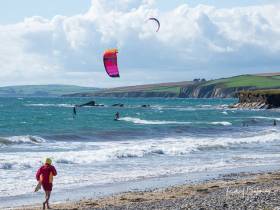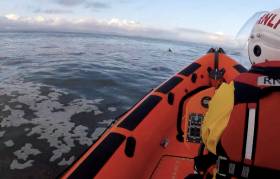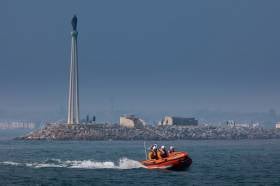Displaying items by tag: Kitesurfing
A kitesurfer who sustained serious injuries in an incident in Co Wexford on Sunday (28 May) is expected to make a full recovery.
As the Wexford People reports, the casualty had been kitesurfing on Lady’s Island Lake south of Rosslare around lunchtime when it’s understood he collided with rocks.
Ambulance crew who attended the scene called on the Waterford-based Irish Coast Guard helicopter Rescue 117 to airlift the casualty from the scene for further treatment.
America Wins But British Kite Foiler Ellie Aldridge Takes Silver at the 2021 Formula Kite World Championships
British kite foiler Ellie Aldridge bagged herself another international medal taking silver at the 2021 Formula Kite World Championships in Torregrande, Sardinia.
With two European titles to her name, Aldridge has now added a world podium to her growing collection of silverware in the new Olympic class.
The world championships in Sardinia is the first since World Sailing announced the kites would get two sets of individual medals as opposed to a single mixed event at the Paris 2024 Olympic Games.
Ahead of Aldridge, American Daniela Moroz once again proved too strong for the international field claiming her fifth consecutive title. France’s Lauriane Nolot completed the podium in third.
Aldridge, 24 from Poole, Dorset, said: “It feels pretty good to come away with second. I was super lucky to qualify directly into the finals in second place because the winds on the final day were crazy, like the most unstable breeze I’ve ever kited in.
 British kite foiler Ellie Aldridge
British kite foiler Ellie Aldridge
“It was a full-on week with wind from almost every direction, so we definitely had the variety you’d want at a world championships.
“Unfortunately I didn’t do enough to take the title away from Daniela this time, but I got a few bullets from her so that’ll keep me happy until next year.”
Aldridge was one of three British female riders to make it through the qualifying series although she had the luxury of going straight through to the final in second place.
Teammates Maddy Anderson and Katie Dabson had the unenviable task of trying to make it through a tough semi-final process in which only one of six could go through to the final showdown from each of the two groups.
Placed in the same group, neither Anderson and Dabson could advance finally finishing their championships in 10th and 13th respectively.
Anderson, 26 from Weymouth, Dorset, said: “We’ve had all sorts of conditions this week, perfect really for a world champs, so in the end I’m really pleased that I managed to put together a decent series, especially after putting in some deep scores on day one.
“I learned heaps this week round the racecourse and also learning to reset after setbacks; I’m motivated and excited to make some big gains over the winter with the team.”
From the other British interests in the fleet, Jemima Crathorne finished in 20th while Lily Young was fifth in the silver fleet on her return from injury.
In the men’s competition, both Connor Bainbridge and Guy Bridge fell just short of a chance for a medal going out at the semi-final stage.
Both posted top ten finishes in qualifying to make the semi-finals but couldn’t get through what is proving to be a very tough route to a medal.
Bainbridge eventually finished sixth with Bridge just behind in seventh.
All results can be found here
British Kite Foilers Seek Medals at Historic World Championships
The Formula Kite World Championships will take place in Torregrande, Sardinia, from October 13 to 17. The event is part of the Open Water Challenge, which celebrates board sports including kite, wing foil and SUP.
A whole host of British athletes will be hitting the water. In the women’s fleet, two-time European champ Ellie Aldridge is joined by Katie Dabson, Maddy Anderson (pictured), Jemima Crathorne and Lily Young, who makes her return to competition following injury. The men’s fleet will see 2019 world bronze medallist Connor Bainbridge and 2020 European bronze medallist Guy Bridge look to come home with some silverware.
"It’s the first Formula Kite World Championships to take place since World Sailing voted to change the competition from a mixed relay to individual fleet racing"
It’s the first Formula Kite World Championships to take place since World Sailing voted in June to change the proposed competition format from a mixed relay to individual fleet racing. That means at Paris 2024 there will be two sets of kite medals, rather than just one. Up until this decision athletes had to team up with another athlete of the opposite sex. Now it’s all down to the individual rider. Athletes will compete in an opening series to determine the top 14 riders, who then go forward into the knockout medal series.
Mixed Offshore Keelboat Dream Dies as IOC Picks Men's and Women's Kiteboarding for Paris 2024
The International Olympic Committee (IOC) has approved Men's and Women's Kiteboarding (Formula Kite) for the Paris 2024 Olympic Sailing Competition, bringing the curtain down on the highly anticipated mixed offshore sailing event.
The Men's and Women's Kiteboarding Events will replace the Mixed Kiteboarding and Mixed Offshore Events that were democratically selected by World Sailing's members and remained World Sailing's first-choice events for Paris 2024.
In December 2020, the IOC advised World Sailing that a further review into the Mixed Offshore event would be undertaken to properly assess key considerations.
Further updates from the IOC in April 2021 specified that the proposal continued to be reviewed, consistent with the approach taken for other sports, and highlighted challenges for the Mixed Offshore Event existing in the areas of Field of Play security, scope and complexity, broadcast cost and complexity, and World Sailing not having the opportunity to deliver an Offshore World Championship.
Whilst the final IOC assessment of the Mixed Offshore Event continued, World Sailing was requested to put forward alternative event proposals for sailing's 10th medal at the Paris 2024 Olympic Games.
World Sailing's Council approved the Men's and Women's Kiteboarding (Formula Kite) and Men's and Women's Two Person Dinghy (470) as the first and second alternative event proposals following their meeting at the 2021 Mid-Year Meeting.
The decision was taken at the meeting of the IOC Executive Board today, Thursday 10 June 2021 in Lausanne, Switzerland following a recommendation from the IOC Programme Commission.
David Graham, Chief Executive Officer, commented, "The World Sailing community selected the Mixed Offshore Event and our slate of events gave a true representation of the depth and breadth of our sport.
"Throughout this process, the Mixed Offshore Event remained our first choice event, with the entire offshore community putting considerable time and effort into the discipline. Today's news will be upsetting for the thriving offshore community, but we will continue to ensure the growth and long-term sustainability of offshore sailing.
"The IOC provided us with clear guidance and their decision-making is consistent with other sports and events. The World Sailing community acted at pace to propose alternative events and we are delighted the IOC have followed our guidance and selected our first alternative proposal of Men's and Women's Kiteboarding.
"Men's and Women's Kiteboarding will bring huge opportunities in terms of universality, developing women's sailing and the media appeal of these exciting events. We now look forward to supporting our athletes on the journey to Paris 2024 and showcasing the sport on the beautiful Marseillaise waters in the south of France."
President Quanhai Li said, "The World Sailing community had limited time to decide on the alternative event for the IOC's consideration. I would like to thank our Council, Member National Authorities, my Board of Directors and management for their big efforts to ensure we had a democratically decided alternative event within a short time frame. I also thank the IOC for their support within the process."
Kitesurfing in Ireland Has a New Voice
A new voluntary organisation has been set up to represent Kitesurfing in Ireland.
"Kitesurfing Ireland was formed earlier this year after it was clear that without representation it is difficult to have a voice", says KI's spokesperson Linda O’Dwyer.
The aim of Kitesurfing Ireland is to represent kitesurfers by promoting responsible kitesurfing, ensure access to kitesurfing locations and kitesurfing activities are in harmony with all beach, lake and water users through working with all the relevant bodies, government, local authorities, NGO'S and other like-minded organisations.
Kitesurfing Ireland is working with Water Safety Ireland to provide the local authorities with signage with Kitesurfing information for the public along with kitesurfers for the 2021 bathing season.
The Kitesurfing Ireland website is here
Kinsale Kitesurfers Enjoy Great Conditions at Garrylucas
Kitesurfers made the most of the fine August conditions at Garrylucas (White Strand) in Kinsale today writes Bob Bateman.
15 to 20-knot winds from the south-west gave the Kinsale kiting community some great conditions near the Old Head of Kinsale as the photos below show.
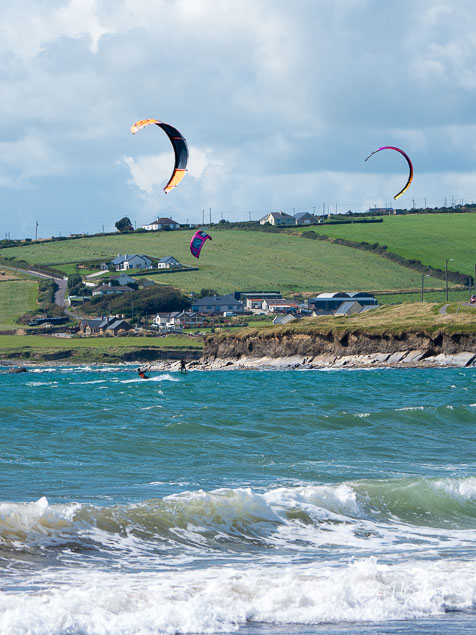
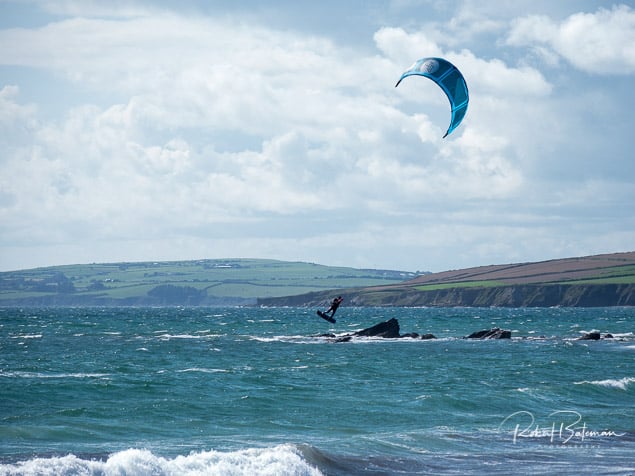
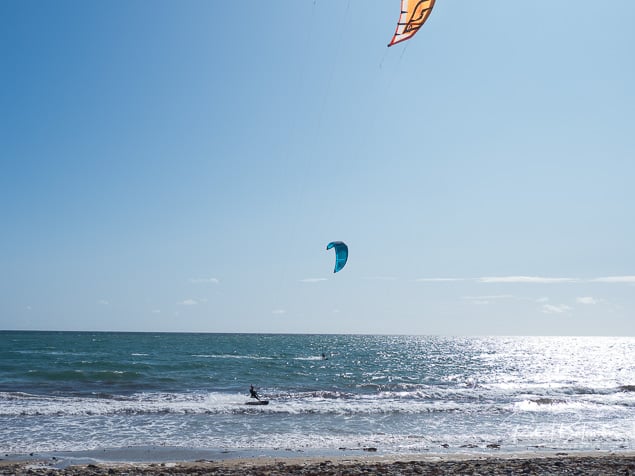
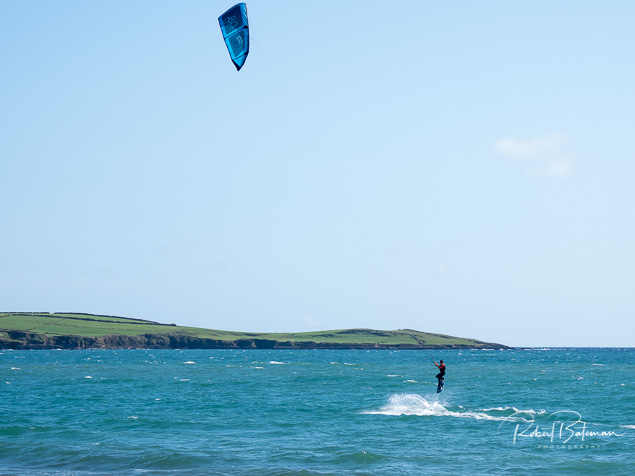
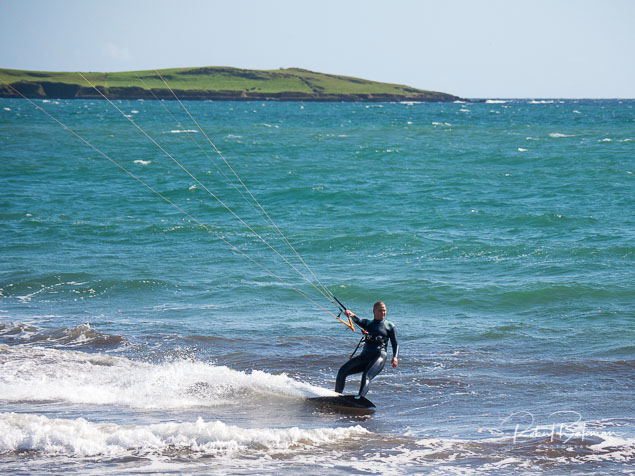
Bundoran Lifeboat Helps Surfer Safely To Shore
#Lifeboats - Bundoran’s RNLI crew assisted a surfer safely to shore on Saturday afternoon (10 November).
The volunteers launched after a member of the public raised the alarm, having spotted someone they thought to be in difficulty and waving their arm off Rougey Point in Bundoran.
The Irish Coast Guard requested the inshore lifeboat to launch at 3.28pm and 10 minutes later the lifeboat, helmed by Killian O’Kelly, was at sea.
Weather conditions at the time were blowing a light south-easterly wind and there was a three-metre swell.
Once on scene, the lifeboat crew observed that the surfer, while not in difficulty or in any immediate danger, was in a challenging part of the sea and some distance away from the shore.
The crew made the decision to take the teenager onboard and transport him safely back to Bundoran Lifeboat Station.
Speaking following the callout, O’Kelly said: “We would like to commend the member of the public who raised the alarm this afternoon — that is always the right thing to do if you see someone you think or know to be in difficulty.
“While this surfer was not in any immediate danger, he was some distance from shore so we made a call to assist him safely back to shore.”
Elsewhere, a person who went missing while kitesurfing off Ballybunion in Co Clare yesterday evening (Sunday 11 November) was found on land several hours later, as RTÉ News reports.
The kitesurfer, who had come ashore at Kilkee, was said to be suffering the effects of cold after spending as much as two-and-a-half hours at sea and was taken to hospital.
#RNLI - Dun Laoghaire RNLI’s inshore lifeboat was called out twice yesterday (Thursday 16 March) to separate instances of kitesurfers in distress.
The first callout was to Dollymount Strand on Bull Island across Dublin Bay, in which the casualty was landed ashore to Howth coastguard volunteers.
The second was off Sandymount, with the kitesurfer involved landed to the care of Dun Laoghaire’s Irish Coast Guard unit.
No medical attention was required in either incident.
Winter Won't Deter The Irish Kitesurfing Project
#Kitesurfing - Raising awareness of this country's perfect conditions for wave-riding – and some of the best local practitioners of the sport – is the aim of a new video series by the Irish Kitesurfing Project.
As Surfer Today reports, the first clip showcases Robert Sayer, Wojciech Piotrowski and Alan Kavanagh braving the winter chill to show off their skills in some seriously strong surf. Here's looking forward to more from this exciting project!
Ballycotton Lifeboat Rescues Kitesurfer In Difficulty
#RNLI - Ballycotton RNLI rescued a kitesurfer who got into difficulty on Ballycotton Bay on Monday afternoon (2 November).
The volunteer crew were requested to launch both their all-weather and inshore lifeboats by the Irish Coast Guard at 12.30pm and go to the assistance of a kitesurfer who was in difficulty but in no immediate danger in Ballycotton Bay on Co Cork.
The alarm was raised by a member of the public who spotted the kitesurfer struggling due to a lack of wind. Weather conditions at the time were described as overcast and calm.
Once on scene, the lifeboat crew assessed the situation before bringing the kitesurfer on board the inshore lifeboat and safely back to shore.
Speaking following the callout, Ballycotton RNLI coxswain Eolan Walsh said: "We would like to commend the member of the public who raised the alarm today. Their quick thinking ensured the lifeboats were launched and that there was a positive outcome."



























